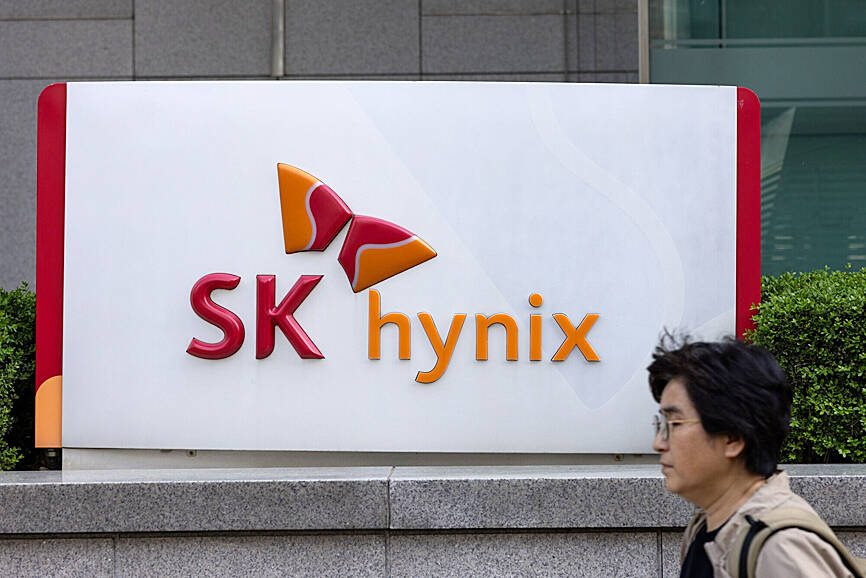The US Department of Commerce yesterday said it plans to award SK Hynix Inc up to US$450 million in grants to help fund an advanced packaging plant and research and development (R&D) facility for artificial intelligence (AI) products in Indiana.
In April, SK Hynix, the world’s second-largest memorychip maker, said it would invest about US$3.87 billion to build the facility in West Lafayette, Indiana.
The facility would include an advanced chip production line to mass-produce next-generation high-bandwidth memory chips, currently used in graphic processing units that train AI systems, the Nvidia Corp supplier said.

Photo: Bloomberg
The commerce department also plans to make available US$500 million in government loans for the SK Hynix project, which is expected to qualify for a 25 percent investment tax credit.
The memory packaging plant for AI products and an advanced packaging R&D facility would create 1,000 jobs and fill a key gap in the US semiconductor supply chain, the department said.
The US Congress in August 2022 approved a US$39 billion subsidy program for US semiconductor manufacturing and related components along with US$75 billion in government lending authority.
US Secretary of Commerce Gina Raimondo said that the department has announced term sheets with 15 companies offering about US$30 billion in funding that “will unlock another US$300 billion of private capital.”
The US has major commitments from all five major leading-edge semiconductor chip manufacturers — Taiwan Semiconductor Manufacturing Co (台積電), Intel Corp, Samsung Electronics Co, Micron Technology Inc and SK Hynix.
“It means we in the United States will have the most secure and diverse supply chain in the world for the advanced semiconductors that power artificial intelligence,” Raimondo told reporters.
No other economy in the world “has more than two of these companies producing leading-edge chips on its shores,” the department added.
SK Hynix CEO Kwak Noh-jung said in a statement that the company deeply appreciates “the US Department of Commerce’s support and is excited to collaborate in seeing this transformational project fully realized.”
The department in May said it planned to award US$75 million to Absolics Inc for constructing a facility in Georgia to supply advanced materials to the country’s semiconductor industry.
The planned award is to an affiliate of SKC Co, which in turn is part of South Korea’s second-largest conglomerate SK Group, as is SK Hynix.

Semiconductor business between Taiwan and the US is a “win-win” model for both sides given the high level of complementarity, the government said yesterday responding to tariff threats from US President Donald Trump. Home to the world’s largest contract chipmaker, Taiwan Semiconductor Manufacturing Co (TSMC, 台積電), Taiwan is a key link in the global technology supply chain for companies such as Apple Inc and Nvidia Corp. Trump said on Monday he plans to impose tariffs on imported chips, pharmaceuticals and steel in an effort to get the producers to make them in the US. “Taiwan and the US semiconductor and other technology industries

SMALL AND EFFICIENT: The Chinese AI app’s initial success has spurred worries in the US that its tech giants’ massive AI spending needs re-evaluation, a market strategist said Chinese artificial intelligence (AI) start-up DeepSeek’s (深度求索) eponymous AI assistant rocketed to the top of Apple Inc’s iPhone download charts, stirring doubts in Silicon Valley about the strength of the US’ technological dominance. The app’s underlying AI model is widely seen as competitive with OpenAI and Meta Platforms Inc’s latest. Its claim that it cost much less to train and develop triggered share moves across Asia’s supply chain. Chinese tech firms linked to DeepSeek, such as Iflytek Co (科大訊飛), surged yesterday, while chipmaking tool makers like Advantest Corp slumped on the potential threat to demand for Nvidia Corp’s AI accelerators. US stock

The US Federal Reserve is expected to announce a pause in rate cuts on Wednesday, as policymakers look to continue tackling inflation under close and vocal scrutiny from US President Donald Trump. The Fed cut its key lending rate by a full percentage point in the final four months of last year and indicated it would move more cautiously going forward amid an uptick in inflation away from its long-term target of 2 percent. “I think they will do nothing, and I think they should do nothing,” Federal Reserve Bank of St Louis former president Jim Bullard said. “I think the

SUBSIDIES: The nominee for commerce secretary indicated the Trump administration wants to put its stamp on the plan, but not unravel it entirely US President Donald Trump’s pick to lead the agency in charge of a US$52 billion semiconductor subsidy program declined to give it unqualified support, raising questions about the disbursement of funds to companies like Intel Corp and Taiwan Semiconductor Manufacturing Co (台積電). “I can’t say that I can honor something I haven’t read,” Howard Lutnick, Trump’s nominee for commerce secretary, said of the binding CHIPS and Science Act awards in a confirmation hearing on Wednesday. “To the extent monies have been disbursed, I would commit to rigorously enforcing documents that have been signed by those companies to make sure we get